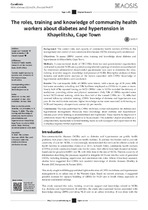| dc.contributor.author | Tsolekile, Lungiswa P. | |
| dc.contributor.author | Schneider, Helen | |
| dc.contributor.author | Puoane, Thandi | |
| dc.date.accessioned | 2018-04-18T13:40:02Z | |
| dc.date.available | 2018-04-18T13:40:02Z | |
| dc.date.issued | 2018 | |
| dc.identifier.citation | Tsolekile, Lungiswa P. ET AL. (2018). The roles, training and knowledge of community health workers about diabetes and hypertension in Khayelitsha, Cape Town. Curationis, 41(1): a1815. | en_US |
| dc.identifier.issn | 2223-6279 | |
| dc.identifier.uri | http://dx.doi.org/ 10.4102/curationis.v41i1.1815 | |
| dc.identifier.uri | http://hdl.handle.net/10566/3601 | |
| dc.description.abstract | BACKGROUND: The current roles and capacity of community health workers (CHWs) in the
management and control of non-communicable diseases (NCDs) remain poorly understood.
Objectives: To assess CHWs’ current roles, training and knowledge about diabetes and
hypertension in Khayelitsha, Cape Town.
METHODS: A cross-sectional study of 150 CHWs from two non-governmental organisations
contracted to provide NCD care as part of a comprehensive package of services was conducted.
An interviewer-administered closed-ended questionnaire was used to determine the roles,
training, in-service support, knowledge and presence of NCDs. Descriptive analyses of these
domains and multivariate analyses of the factors associated with CHWs’ knowledge of
hypertension and diabetes were conducted.
RESULTS: The vast majority (96%) of CHWs were female, with a mean age of 35 years; 88%
had some secondary schooling and 53% had been employed as CHWs for 4 years or more.
Nearly half (47%) reported having an NCD. CHWs’ roles in NCDs included the delivery of
medication, providing advice and physical assessment. Only 52% of CHWs reported some
formal NCD-related training, while less than half of the trained CHWs (n = 35; 44%) had
received follow-up refresher training. CHWs’ knowledge of diabetes and hypertension was
poor. In the multivariate analyses, higher knowledge scores were associated with having an
NCD and frequency of supervisory contact (≥1 per month).
CONCLUSIONS: The roles performed by CHWs are broad, varied and essential for diabetes and
hypertension management. However, basic knowledge about diabetes and hypertension
remains poor while training is unstandardised and haphazard. These need to be improved if
community-based NCD management is to be successful. The potential of peer education as a
complementary mechanism to formal training needs as well as support and supervision in the
workplace requires further exploration. | en_US |
| dc.language.iso | en | en_US |
| dc.publisher | AOSIS | en_US |
| dc.rights | © 2018. The Authors.
Licensee: AOSIS. This work
is licensed under the
Creative Commons
Attribution License. | |
| dc.subject | Community health workers | en_US |
| dc.subject | Non-communicable diseases | en_US |
| dc.subject | Khayelitsha | en_US |
| dc.subject | Cape Town | en_US |
| dc.title | The roles, training and knowledge of community health workers about diabetes and hypertension in Khayelitsha, Cape Town | en_US |
| dc.type | Article | en_US |
| dc.privacy.showsubmitter | FALSE | |
| dc.status.ispeerreviewed | TRUE | |

